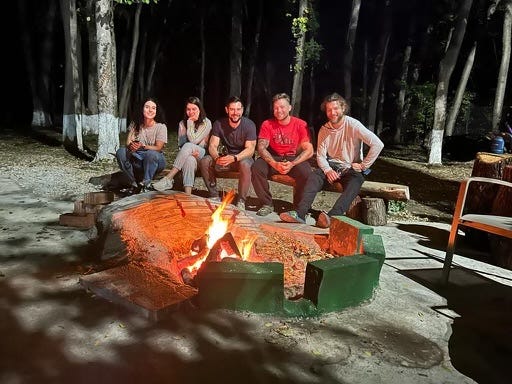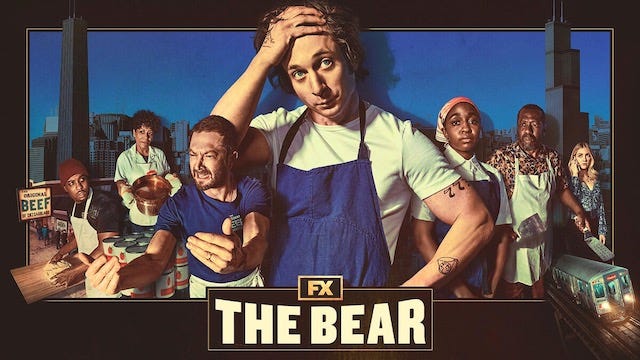#29: The paradox of Individualism and Collaboration
Navigating the intertwining paths of personal ambition and team success
Hey friends,
Not many things happened in the last week from a personal point of view. After the vacations, team building, and runs, I’ve finally settled into a nice rhythm of writing in the morning, working during the day, and going to the gym in the evening.
Well, at least that’s what I did starting Wednesday, because I was a bit sick in the first part of the week—a cold that kept me inside for a couple of days.
I now focus more on LinkedIn, and I try to write a post about leadership, business, or productivity every day. I think the audience there is more suitable for what I’m writing.
X is a lot more controversial; it’s full of politics and solopreneurship dreams. While I, on the other hand, write about growing your career and being happily employed.
Of course, I don’t bash entrepreneurs; I would never do that, as I admire people who take ownership. What I do not agree with is the dream that so many people sell on X:
It’s easier to make money if you’re on your own, and you don’t need any experience to do it.
And that makes me a bit angry because I know there are so many young people who start believing this, and they end up disappointed and frustrated.
Because, let’s be honest, even if it’s never been easier to build an online business, it’s still more convenient to get a job.
Especially if you’re young and inexperienced, working, at least for some years, in a good company will teach you so many things that you could rely on later, when you want to start your own.
So, anyway, LinkedIn has more people who are interested in their professional development, and I like to get into the conversations there.
We had a very relaxing weekend, and for the first time in a while, I started reading a fiction boo
k. As the weather was beautiful, I could take advantage of our terrace and spend some time out there with a book and coffee. Saturday evening, we went to our friends’ house for a barbecue near the fire and to watch the final of the rugby game.
And on Sunday evening, we went to see a theater play. Something that I’ve also not done in a while. When I was in my 20s, I would go to the theater at least once every couple of weeks, but somehow after that, I just stopped going.
One of the reasons is lack of time, of course, and the other reason is that you always need to keep a close eye on the tickets, as they run out very fast.
The play is a one-woman show, starring my favorite Romanian actress, Raluca Aprodu. It started as a very casual, funny rom-com and ended in a very disturbing manner.
It addresses “family annihilation”, a term I had never heard before, which means killing at least two close family members.
And it seems it’s more common than we think.
It was a very intense play, and the actress put on a great performance.
Theatre has the power to change your mood and get you thinking about subjects you don’t normally think about.
And these thoughts don’t leave you once you leave the building; they linger on for a few days. At least that’s what I feel about this play.
On a more positive note, as one of my friends always says:
“You know what day is tomorrow? It’s the first day of the rest of our lives”
So let’s start the week full of optimism and ready to crush our goals.
The Paradox of Individualism and Collaboration
I wrote a LinkedIn post last week about how we are taught in school to be individualists and how we are supposed to be team players when we get hired.
I wanted to expand on this topic here.
It's not uncommon to hear leaders complain about the lack of teamwork within their ranks.
But is it any wonder when the foundation of our educational system is built on individual achievement?
The School of Individualism
Our educational institutions, with their age-old traditions, have always championed the singular. Think back to your school days.
All the hours spent preparing for solo exams, where collaboration was not just discouraged but penalized?
Nights spent dedicated to individual projects and homework assignments where seeking help was often seen as a sign of weakness.
And who could forget the stern warnings against plagiarism, emphasizing the importance of original, individual work?
This system was designed for a different era, where individual roles were clear-cut and personal achievements took precedence.
The message was clear: excel on your own.
The Corporate Shift
But as the world evolved, so did the nature of work. The rise of technology and globalization has changed the dynamics.
Companies like Google and Apple have shown the power of cross-functional teams, where diverse skills come together to create products that change the world.
Modern workplaces, facilitated by technologies like Zoom and Slack, have blurred the boundaries of roles, making collaboration not just beneficial but essential.
Organizations like Tesla emphasize shared missions and visions, underscoring the importance of collective achievement over individual glory.
In this new world, the isolated genius can no longer find his place.
Success hinges on the collective, on teams that function as cohesive units.
The Corporate Paradox
Yet, here lies the issue. Even as organizations march on about the virtues of teamwork, the structure remains hierarchical.
The corporate ladder, with its limited rungs, is a stark reminder of the zero-sum nature of promotions and leadership roles.
For every individual that ascends, many remain behind.
This duality presents a puzzle.
Striking a Balance
It's the question that lingers in the minds of many professionals:
How can one balance personal ambitions with the demands of collective success?
Recognize the Dual Value: Understand that both individual contributions and team successes are essential. While personal milestones drive innovation, collective achievements ensure sustainability.
At Apple, Steve Jobs is often credited with the vision behind products like the iPhone. However, it was the collective effort of engineers, designers, and marketers that turned that vision into a tangible, market-leading product.
Jobs' individual brilliance drove the innovation, but the team's collective effort ensured the iPhone's sustained success and dominance in the market.
Foster a Collaborative Mindset: Cultivate an environment that values open communication, mutual respect, and shared goals. By doing so, you pave the way for harmonious teamwork, even in a competitive landscape.
Pixar Animation Studios is renowned for its culture of collaboration.
The company's "Braintrust" meetings, where filmmakers gather to review and critique each other's work, are a testament to this.
In these sessions, open communication is encouraged, feedback is given with mutual respect, and the shared goal is always to create the best film possible.
This environment allowed movies like "Toy Story" and "Finding Nemo" to thrive, even when their initial concepts faced challenges.
Celebrate Both Wins: Just as individual accolades are important, so are team victories. Create a culture that recognizes and rewards both, ensuring that neither is overlooked.
At Microsoft, individual contributors who develop standout features or solutions might be recognized with awards or bonuses.
At the same time, when a product like Windows achieves a significant milestone, the entire team, from developers to marketers, celebrates together, recognizing the collective effort that led to the success.
Promote Ethical Competition: While competition is inherent in the corporate structure, it's essential to ensure it remains healthy and constructive. Encourage competition that uplifts rather than undermines.
Salesforce hosts an annual "hackathon" where teams compete to develop innovative solutions. While there's a competitive spirit, the emphasis is on uplifting each other, sharing knowledge, and building on each other's ideas.
Teams are encouraged to view competitors not as adversaries but as peers from whom they can learn.
The winning solutions often integrate multiple teams' ideas, showcasing the benefits of constructive competition.
Conclusion
The balance between individual aspirations and collective goals is delicate, requiring constant recalibration.
But by recognizing the value of both and fostering an environment that celebrates each, we can navigate the corporate paradox with grace and success.
I'm eager to hear your thoughts on this delicate balance.
How do you navigate the intertwining paths of personal ambition and team success in your professional journey?
Recommendation: The Bear, on FX and Disney Plus
I don’t remember the last time I watched a series this good. It’s probably since “The White Lotus”, come to think about it.
The Bear is the story of a Michelin-starred chef who returns to his hometown of Chicago to take over the family restaurant his brother left in his will. After he committed suicide.
Michael, the star, finds a very diverse crew at the restaurant, and he tries to implement the top-restaurant systems to which he is accustomed.
The first season was highly appreciated, with Rotten Tomatoes giving it a 100% rating based on 79 reviews and a 92% audience score based on 1,000+ ratings.
The critics appreciated the perfect blend of ingredients in the storyline, likening it to an expertly constructed sandwich.
In its second season, the series underwent a transformation from a fast-paced, stress-filled dramedy about a Chicago beef spot into a more introspective, calming character study.
Personally, I thought the first few episodes were a little slow-paced. Then you have a few episodes that take 30 minutes, but you thought they took 5 minutes. That’s how fast-paced they are, and they keep you on your toes.
But the second season blew my mind. It is more focused on the characters in the show, showing their history, their frustrations, and their ambitions. But most importantly, it shows us they are all humans and, just like all of us, full of flaws and weaknesses.
I still think about this motto, “Every second counts”, but from a different perspective.
As we see in the show, for Michelin restaurants, speed and service are of the essence, which means you need to be like clockwork.
But I took a different perspective from it, and it’s about us, about our finite time on this planet.
Because when you think about it, as the saying goes, “the days go slow but the years go fast”, we think we have all the time in the world, but in reality, we need to make sure we spend it as meaningfully as possible.
Which means making sure we nurture the right relationships, work for the right purposes, and spend our free time following our passions.
Because, at the end of the day, we choose how we treat every second of our lives.
Thank you for reading, and let me know if you liked something in particular in this newsletter.
Until next time,
Leo
P.S.: If you would like to read my content daily, don’t forget to follow me on Twitter and Linkedin.
P.S. 2: If you want to take your productivity to the next level, check out my extensive Productivity course that can accelerate your career.







